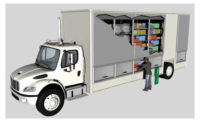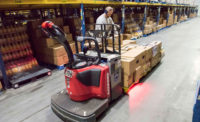Transporting cases, crates, kegs and additional point-of-sale items from warehouses and trucks into retailers often is a physically demanding task. Thankfully for delivery personnel, suppliers remain dedicated to developing hand trucks and carts to help ease the heavy burden of beverage delivery. With the products providing the bulk of the weight, hand truck and cart manufacturers focus on lightweight, sturdy innovations that also are rugged and reliable.
“We continue to see a desire for safe, ergonomic hand trucks,” says Andrea Horner, marketing manager for Magline Inc., Standish, Mich. “One of the biggest considerations remains weight. Most injuries don’t happen from one-time occurrences; they happen from repetitive movements over time like lifting a hand truck on and off a truck multiple times per day. Empirical evidence tells us that once a driver sustains a job-related back injury, the chance of reoccurrence within a two-year time period is 50 percent.”
Magline offers its Magliner brand of aluminum hand trucks and cart systems that are among the lightest models available, Horner says. “An aluminum hand truck can be as much as 30 pounds lighter than a steel version, which equates to a driver lifting more than 140 extra tons per year,” she notes.
The company uses a special aircraft-grade aluminum extrusion that is able to handle products and also ensure years of use for its customers, who recently have become particularly interested in product longevity, Horner says.
“With the economy, distributors are trying to make their equipment last as long as possible,” she explains. “They are repairing rather than replacing whenever possible. Magline pioneered the modular concept for hand trucks decades ago to allow users the flexibility to replace only worn parts to significantly extend product life.”
Designed for delivery
In addition to its line of hand trucks, Magline also offers two options of hand cart systems: the Rapid Delivery Truck and CooLift. The company’s options allow distributors to select the system that best suits their needs, Horner says.
Magline’s Rapid Delivery Truck is an 18-inch by 60-inch cart with 48-inch vertical end racks on each side that is available in standard or soft drink models. The soft drink model is built from the same base as the standard model, but has an extra handle position at one end to support PET packaging, according to the company.
The company also offers a range of accessories for its Rapid Delivery Trucks including a curb ramp, foot brake and containment curtain that shields products during delivery. For the models with 6-inch casters, an optional quick-pick adaptor for walkie-rider trucks can be purchased that allows direct-picking and loading of products onto the Rapid Delivery Trucks in the warehouse. Due to its aircraft-grade aluminum construction, Magline has offered a three-year warranty on Rapid Delivery Trucks since 2008, Horner notes.
Many beverage distributors that have changed from traditional side-load delivery trucks have adopted Magliner’s CooLift delivery system, Horner explains. CooLift helps improve account efficiency through higher capacity loads, pre-picked orders and drop-and-wrap CooLift pallets for no-touch merchandising displays, the company says. The cart system is comprised of an extruded aluminum frame, six-wheel design, 24-volt battery, hydraulic lifting system and hydraulic wheel disc brake system.
The CooLift can be used with its own high-density polyethylene pallet that can be pre-built in the warehouse, dropped in the store on its 13.5-inch raised platform and wrapped with signage to prevent product damage and hide the pallet, the company says.
Horner notes that Magline customers have seen employee morale improve following implementation of the CooLift.
“Cart systems allow drivers to deliver more product in less time with less physical stress,” Horner says. “Beverage drivers tell us changing from side-load to system delivery has increased their longevity on routes. We regularly hear stories from drivers who feel so much better at the end of the day, and now have energy for family and recreational activities. Driver wellness is important to longevity but also affects their attitude today; they are the face of the distributor to the customer, so a driver who feels good reflects positively on the company.”
Magline continues working on innovations to better serve its customers, Horner says.
“Our customers help us design the next generation of delivery solutions,” she explains. “What’s unique about Magline is we engineer everything — from small product line changes like more ergonomic hand grips to large systems like carts and CooLift.”
Alleviating lifting
As a metal fabricator and wine distributor, John Benko, founder of Benko Products, Sheffield, Ohio, was in a unique position to develop a new cart to help beverage distributors. Five years ago, while watching drivers load and unload trucks, Benko was inspired to design an ergonomic hand truck for keg and case delivery. After finalizing the design and materials, Benko Products released the Erg-O-Cart, which uses a raising platform for easier loading, he says.
“It is designed to load kegs and cases directly off the truck at waist level,” Benko explains. “The kegs themselves would actually be rolled to our platform, then you would just press down on our platform, it locks in place and then you transport it. It would be the same thing with the cases: you would load it on at waist height and as you get enough cases, it will automatically lower. Then when you want to transport, you just press it down and you’re ready to go.”
The U.S. Department of Labor’s Occupational Safety & Health Administration (OSHA) regulations on torso bending, Benko notes, recommend the use of carts that minimize manual lifting, load at waist level and have an adjustable height load. Benko designed the Erg-O-Cart’s raising platform at a height of
20.5 inches, which is the average height of a truck, he notes. “I haven’t seen a truck where I couldn’t roll the keg off; it really makes it effortless,” Benko says.
The Erg-O-Cart is made of magnesium and weighs 35 pounds, Benko says. The raising platform also collapses to allow the Erg-O-Cart to be used as a regular hand cart, he notes. Overall, Benko says the product is easily understood.
“When you see the picture of it, that’s how it works,” he says. “It’s the simplicity that will sell it. It should be very rugged. It’s going to be very reliable. We have anodized coatings for corrosion; everything that we could possibly think of has been taken care of.”
Vending versatility
San Jose, Calif.-based Ultra Lift Corp.’s same-named powered hand trucks also were designed to ease the effort of heavy lifting. Ultra Lift models are able to handle 1,500-pound loads, such as vending machines and beverage coolers.
“The biggest thing we offer is that virtually any vending machine made, two people can move with an Ultra Lift and it’s not difficult,” says George Dabb, president of Ultra Lift Corp. “…We’ve added accessories like the Vertical Move Assembly that extends the capability of the Ultra Lift and the StrongArm extension handle. The Vacuum Grip Handle is a suction cup that you can pump three or four times and now you’ve got a handle on the vending machine and can move it around a whole lot more effectively and with less damage to hands.”
Ultra Lift models weigh 120 pounds and have a high-torque motor that helps to move equipment, especially up or down stairs. Dabb says that the Ultra Lift can move a 750- to 850-pound piece of equipment up or down a minimum of 500 stairs on a single battery charge.
“When you’re climbing stairs, you hit the switch and raise the wheels up to the second step, then you hold down on the extension handle and hit the switch the other way,” he explains. “The [load is heaviest] when you first hit the switch, but every inch the load travels toward you, it gets lighter. The faster it does that, and the less work you have to do to get it there, the better off you are.”
The company’s StrongArm Extension Handle, which provides extra leverage by adding 12 inches to Ultra Lift’s overall height, also decreases the effort of moving a machine down stairs by up to half, Dabb explains. Another company-engineered accessory is the Portable Landing Extender, which adds 33 inches to small landings, Dabb says. Designed to ease moves in tight spaces, the accessory was developed by one of the company’s affiliated dealers that repeatedly encountered the issue, he explains.
“[Our Texas dealers] kept running into landings that were too small for the vending machines that they were trying to get around them, so they developed what we call now the Portable Landing Extender,” Dabb explains. “It’s three upside-down stairs with a wooden deck on top of them. It’s 30 inches wide and 33 inches deep, and you have to at least be able to get the wheels up on the landing, but once you get there you can have the vending machine hanging out in mid-air and your partner slides the deck in place — you’ve just added 33 inches to a landing.”
Ultra Lift also has received positive feedback from customers who have implemented the Ultra Lift. Dabb explains that one customer said it used to spend about
$1 million each year on injuries related to moving vending machines. Three years after implementing Ultra Lift machines and accessories, the company had yet to spend a cent on vending machine-related injuries, Dabb says. BI





